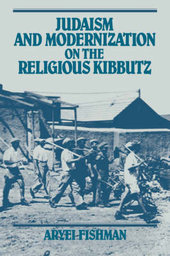
|
Judaism and Modernization on the Religious Kibbutz
Hardback
Main Details
| Title |
Judaism and Modernization on the Religious Kibbutz
|
| Authors and Contributors |
By (author) Aryei Fishman
|
| Physical Properties |
| Format:Hardback | | Pages:220 | | Dimensions(mm): Height 235,Width 161 |
|
| Category/Genre | Judaism |
|---|
| ISBN/Barcode |
9780521403887
|
| Classifications | Dewey:296 |
|---|
| Audience | | Professional & Vocational | | Tertiary Education (US: College) | |
|---|
|
Publishing Details |
| Publisher |
Cambridge University Press
|
| Imprint |
Cambridge University Press
|
| Publication Date |
25 June 1992 |
| Publication Country |
United Kingdom
|
Description
This study examines the capacity of traditional Judaism to renew itself in response to the challenge of modernity. Concentrating as it does on the major Jewish Orthodox movements of the nineteenth and twentieth centuries, the book focuses especially on the Religious Kibbutz Federation in Israel, whose pioneering settlements attained a sophisticated synthesis of modern and traditional Jewish culture at the community level. Professor Fishman provides the first sociological study of the formation of modern Orthodox Judaism, as well as the first scholarly study of the religious kibbutz.
ReviewsFishman, as a phenomenologist, allows us to experience, vicariously, the tensions between religious commitment, socialist norms, and economic realities better than an externalist analysis might." Contemporary Sociology "Students of the kibbutz and of religious movements will find this study worth their close attention." Walter Hirsch, Shofar "...a noteworthy contribution to the study of religion and modernization..." American Journal of Sociology "What makes his contribution particularly unique is that his focus is on the Religious Kibbutz Federation in Israel, a federation that was not only religious, but which also incorportated the central values of Jewish nationalsim and socialism. Moreover, he inverts the usual approach to Orthodoxy by suggesting that traditional Judaism can provide 'vigorous mechanisms for legitimate innovation in response to modernity, as well as limit change'...Fishman deftly characterizes the intellectual processes and forces whereby the very traditions that rail against modernism become modern phenomena by skillfully weaving an array of theoretical arguments and primary data to make his points. Fishman leaves the reader with an appreciation of his command of the historical scholarship." Debra Kaufman, Critical Review
|